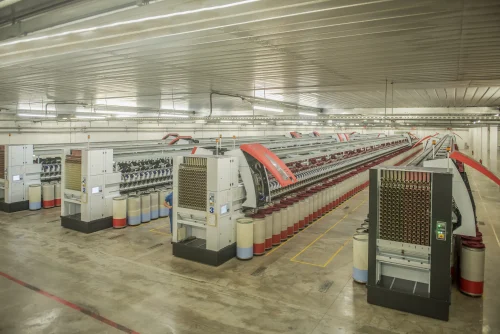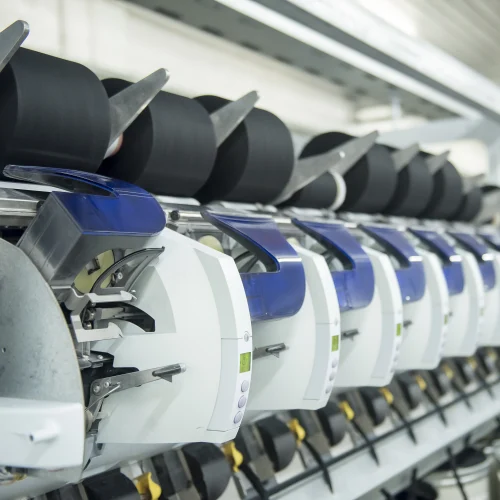
Science Meets Fashion: Groundbreaking Regenerated Yarn Technologies
15 May 2025
Solution to the Water Crisis: Protect Water Resources with Recycled Yarn
20 May 2025Recycled yarn applications, one of the most important steps toward sustainability in the textile industry, are yielding impressive results across various fields from fashion to home textiles. Products made from yarns derived from textile waste and plastic bottles help solve environmental issues while creating economic value. In this article, we examine successful uses of recycled yarn and innovative approaches in this field.
As the environmental impact of the textile industry is increasingly scrutinized, recycled yarn applications are emerging as a key sustainable solution. Today, yarns derived from textile waste are making impressive appearances across various fields, from fashion to home textiles. Thanks to recent technological advancements in textile waste processing, products made from recycled yarns can now compete in quality and aesthetics with top-tier materials.
This article explores successful implementations of recycled yarn. We will also examine how leading global brands are creating groundbreaking collections aligned with their sustainability goals. Furthermore, we will detail how many of the textile products we use daily can be produced from recycled yarns and analyze the environmental impact of these applications. Thus, this article reveals the potential of recycled yarn by presenting concrete examples of sustainable transformation in the textile industry.
Successes of Recycled Yarn in the Fashion Industry
 The use of recycled yarn by luxury fashion brands has significantly increased in recent years. Initially spearheaded by small, independent brands embracing sustainable fashion, global giants have now joined the trend. As a result, collections crafted from yarns made from textile waste have begun appearing on the runways.
The use of recycled yarn by luxury fashion brands has significantly increased in recent years. Initially spearheaded by small, independent brands embracing sustainable fashion, global giants have now joined the trend. As a result, collections crafted from yarns made from textile waste have begun appearing on the runways.
For example, globally renowned sportswear brands have launched performance apparel made from recycled polyester yarn derived from plastic bottles. In doing so, they contribute to reducing ocean plastic pollution while offering consumers environmentally friendly alternatives. Moreover, the quality of these products is in no way inferior to their conventionally produced counterparts.
High-end fashion brands are also increasing their use of recycled yarns in their collections. Initially introduced through small capsule collections, recycled materials are now prominently featured in their main lines. This transformation in the fashion industry proves that recycled yarn can be associated with luxury and quality.
Use of Recycled Yarn in Home Textiles
The home textiles sector is another area where recycled yarn is being successfully applied. From bed sheets to curtains, towels to blankets, recycled yarns are being used in a wide range of products. Additionally, as consumer awareness about environmental issues grows, demand for sustainable home textile products is rapidly increasing.
Bed sheets made from recycled cotton yarns can be just as soft and comfortable as traditional cotton sheets. In fact, when processed using the right techniques, these products can have a long lifespan. This ensures efficient resource use while offering consumers high-quality alternatives.
Recycled yarn use is also becoming more common in decorative items such as pillow covers, tablecloths, and runners. Notably, luxury hotels and restaurants are starting to update their décor with recycled materials in line with sustainability goals. As a result, demand from corporate clients for recycled yarn products is on the rise.
Innovative Home Textile Applications
Innovation in home textile products made from recycled yarn continues at full speed. For example:
• Integration with smart technologies: Curtains made from recycled polyester yarn integrated with LED lighting systems offer both decorative and functional solutions.
• Antibacterial properties: Recycled cotton is treated with special processes to gain antibacterial properties, making them safe textile products for children’s rooms.
• Thermal regulation features: Bed covers made from recycled yarns and equipped with special heat-regulating technologies contribute to energy savings, enhancing sustainability.
Recycled Yarn Solutions in Technical Textiles
Recycled yarn usage is becoming increasingly widespread in technical textiles as well. From the automotive to the construction sector, agriculture to medical textiles, fabrics made from recycled yarns are being widely adopted.
In the automotive sector, fabrics used in vehicle interiors are now largely made from yarns derived from recycled PET bottles. This not only reduces the carbon footprint of vehicles but also enables the reuse of plastic waste. These fabrics also perform on par with traditional ones in terms of durability and abrasion resistance.
Geotextiles used in the construction industry are among the successful examples of recycled yarn applications. These products are used for soil stabilization, erosion control, and filtration. Geotextiles made from recycled yarn offer both economic and environmentally friendly solutions.
Industrial Applications and Innovative Approaches
In industrial areas, the use of recycled yarn provides significant opportunities for achieving sustainability goals:
• Filtration systems: Filter fabrics made from recycled yarns perform excellently in water and air filtration systems, offering double benefits in conserving natural resources.
• Transport solutions: Durable fabrics made from recycled yarns are used in industrial transport sacks and big bags. These products offer high load capacity and long service life.
• Agricultural textiles: Recycled yarns are effectively applied in irrigation systems, crop protection, and post-harvest storage textiles.
Recycled Yarn in Sports and Outdoor Textiles
 The sports and outdoor apparel sector has become one of the most common areas for recycled yarn usage. Leading sportswear brands are increasing the proportion of recycled materials in their collections as part of their sustainability strategies.
The sports and outdoor apparel sector has become one of the most common areas for recycled yarn usage. Leading sportswear brands are increasing the proportion of recycled materials in their collections as part of their sustainability strategies.
Performance sportswear is being produced from yarns derived from recycled PET bottles. These garments offer the same performance as their traditional counterparts in terms of moisture management, quick-drying, and breathability. Designed for athletes, these products provide eco-friendly alternatives without compromising user experience.
Recycled yarns are also widely used in outdoor gear. From tents to backpacks, sleeping bags to outerwear, fabrics made from recycled yarns are preferred. These products reflect the preferences of environmentally conscious consumers interested in nature sports.
Pioneering Applications by Sports Brands
Recycled yarn applications in the sports industry have sparked a kind of competition among brands:
• Jerseys for professional teams: Uniforms made from recycled yarns are used in major international sports events, spreading the sustainability message to millions.
• Olympic collections: Recycled yarn is now standard in the equipment prepared for the Olympic Games. Choosing sustainable products in such prestigious events inspires the entire sector.
• Consumer education campaigns: Sports brands organize awareness campaigns to promote the use of recycled yarn and encourage the recycling of old products.
Conclusion
Recycled yarn applications are among the most important steps taken towards sustainability in the textile industry. Successfully applied across many fields—from fashion to home textiles, technical textiles to sportswear—this approach addresses environmental problems while also creating economic value. Moreover, transforming textile waste and plastic bottles into yarn contributes to the conservation of natural resources and helps reduce carbon emissions.
In the future, recycled yarn applications are expected to become even more widespread and supported by new technologies. Especially as consumer demand for sustainable products increases, brands are stepping up their investments in this area. Therefore, using recycled yarn is not only an environmental responsibility but also a strategic move that provides a competitive advantage. The pioneering work of firms like Seryaman Textile sheds light on the future of the industry and proves that sustainable textile production is indeed possible.



